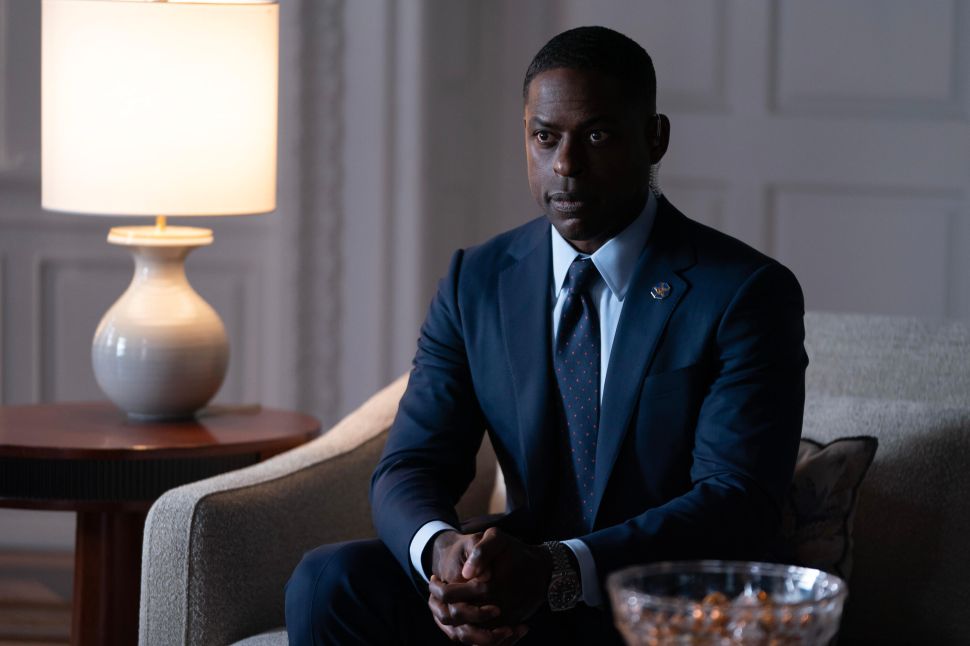You’ll already be in too deep with Paradise by the time its worst moment rears its tone-deaf head, but maybe you need to get through the episodes to be truly floored by the beat that sees Secret Service Agent Xavier Collins (Sterling K. Brown) inexplicably retake control of the story while a somber piano ballad cover of “Eye of the Tiger” plays. I nearly shut my laptop then and there, but unfortunately I still had more episodes to watch.
Paradise is the kind of high-concept thriller that you could expect to see on network TV. Created by This Is Us mastermind Dan Fogelman, the Hulu series takes pride in its ever-unfolding mysteries and slight social commentary, and there’s even an odd fade to black or two that seem perfectly placed for commercial breaks. (It was recently announced that the first episode of the show will air on ABC and FX over the course of the next week, an interesting layer to its aims.) As for the story, Xavier is the right-hand man of President Cal Bradford (James Marsden), his protection detail as well as his friend. But when Cal ends up dead and Xavier is identified as the last person to see him, the agent finds himself in the middle of a massive underground conspiracy. It’s obvious there’s something bigger going on, and that there’s more the series is hiding. While critics have been warned off of discussing those secrets (expect a Big Reveal that Changes Everything), you can be sure that they have something to do with the icily pragmatic tech genius in Cal’s inner circle, Samantha (Julianne Nicholson).
Seven out of the series’ eight episodes were provided for review, and they don’t make for the most coherent product. The show is big on flashbacks to piece together its story, with several episodes focusing on a given character. Some are more effective than others, like Samantha’s arc about losing her young son to a strange illness; it’s a bit sappy, sure, but Nicholson gets to show off in a few emotionally powerful scenes. Later, an episode purporting to focus on one of Xavier’s coworkers reveals a backstory that’s deathly serious but hopelessly hokey. The show never really hones in on the complexity it introduces, leaving a lot of genuinely interesting ideas unexamined.
Uneven character moments aside, the majority of Paradise’s story hinges on its big secret twist. Spoiler alert: that secret is kinda silly. If you’re not on board with it from the outset, the show does very little to convince you. In fact, it frequently invites more questions than answers, and you may get caught up pondering the mechanics of this silly little twist more than you focus on the actual show. And while the stellar seventh episode is a reversal of that trend, exploring motivations and moralities and featuring a strong performance from Marsden, it’s too late in the series to win you back.
There are plenty of overlapping familial and interpersonal dramas at play in Paradise, but that’s not to say this Fogelman’s return to This Is Us territory. If anything, it’s closer to the creative’s disastrous movie Life Itself. Attempts at metanarratives, strained connecting storylines, and genuinely painful pop culture references (to say nothing of the multiple ultra-dramatic covers of rock songs from yesteryear)—this show has it all. That’s not to call it an abject failure, but its lofty goals go largely unmet.
Paradise is the kind of series that falls apart the more you look at it, no matter how much its capable cast tries to hold it together. The antagonist goes from moderately complex and emotionally wounded to a smug self-declared “Bond villain.” Xavier’s plan to get to the bottom of things is so vague and slapdash that it barely registers, even as it’s happening. The penultimate episode of the series goes so far as to throw a gigantic wrench into the murder investigation, rewriting the stakes seconds before the credits roll. While there’s no telling how this show will end now, there’s not much of a point in sticking around to find out.

